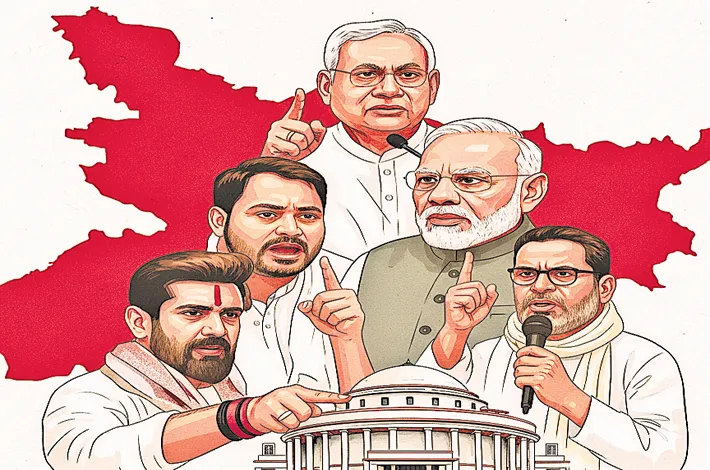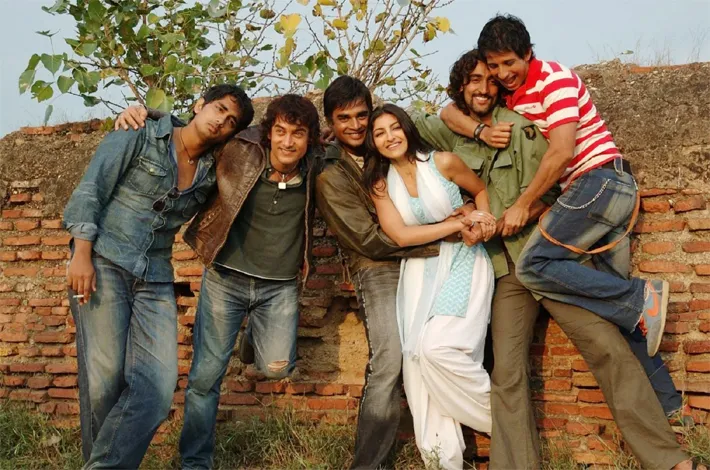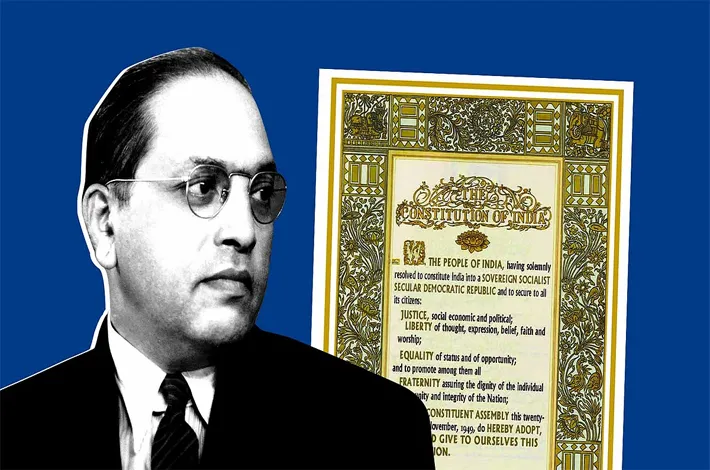Bihar elections: Freebie frenzy sparks fiscal concerns
26-10-2025 12:00:00 AM

What Mahaghatbandhan promises
- Rs 30,000 monthly salaries for Jivika workers.
- Permanent government jobs for one member of every family
- Rs 1,500 monthly pensions for the elderly and disabled
- Loan waivers and insurance cover up to Rs 5 lakh
- 2 crore government jobs at a basic salary of Rs 3 lakhs per employee per year would make salary bill to Rs 6 lakh crore—double the state’s current budget and equivalent to India’s defense budget.
How BJP defends
- Claims budgetary provisions were made in February itself.
- Terms the election promises as “empowerment program for women” rather than “freebies”
What critics point out
- Present state’s budget would not be sufficient to fulfill these promises.
- No money would be available for long term development projects.
The issue:
Reckless promises made by parties ahead of Bihar polls, without thinking about the fiscal consequences.
What BJP promises
- Rs 10,000 to 1.21 crore women under the Mukhyamantri Mahila Rozgar Yojana.
- Rs 1,100 monthly pensions for widows and the elderly
- Rs 1,000 for unemployed youth, free electricity and gadgets like tablets and mobiles for community workers
- Estimated cost of these schemes is Rs 33,000 crore—equivalent to Bihar’s entire capital expenditure budget.
As nominations for the second phase of Bihar's elections coming to an end the political landscape in the state has descended into a fierce competition of freebies, raising serious questions about fiscal sustainability. Both the National Democratic Alliance (NDA) and the Mahagathbandhan have rolled out a slew of promises, from cash handouts to job guarantees, in a bid to woo voters, but critics argue this approach risks plunging Bihar into deeper financial distress.
Leading the charge on this issue, several eminent journalists, economists and political analysts slammed both coalitions for their reckless promises. They alleged that the election battle in Bihar has become a battle of freebies yet again without any policy or governance record, highlighting the state’s precarious financial situation. Bihar’s total debt stands at Rs 2.85 lakh crore, with a debt-to-GSDP ratio of 33.42%, breaching the Finance Commission’s recommended limit of 32.57%. The per capita debt is Rs 21,773, and the state already spends Rs 23,000 crore annually on interest payments alone. The fiscal deficit, pegged at Rs 29,000 crore, or 4.3% of GSDP, further underscores the strain on Bihar’s economy.
The NDA, led by the BJP and Chief Minister Nitish Kumar, has promised Rs 10,000 to 1.21 crore women under the Mukhyamantri Mahila Rozgar Yojana, Rs 1,100 monthly pensions for widows and the elderly, Rs 1,000 for unemployed youth, free electricity and gadgets like tablets and mobiles for community workers. The estimated cost of these schemes is Rs 33,000 crore—equivalent to Bihar’s entire capital expenditure budget. Economists warned that it would leave the government with hardly any money left for development, criticizing the BJP for abandoning its earlier stance against freebies.
The Mahagathbandhan, led by the Rashtriya Janata Dal (RJD), has upped the ante with even more ambitious promises. RJD leader Tejashwi Yadav pledged Rs 30,000 monthly salaries for Jivika workers, permanent government jobs for one member of every family and Rs 1,500 monthly pensions for the elderly and disabled, alongside loan waivers and insurance cover up to Rs 5 lakh.
It is also being pointed out that fulfilling the RJD’s promise of 2 crore government jobs at a basic salary of Rs 3 lakhs per employee per year would balloon Bihar’s salary bill to Rs 6 lakh crore—double the state’s current budget and equivalent to India’s defense budget. Congress leaders who are part of the Mahagathbandhan however emphasized the need for sustainable empowerment through jobs and healthcare, pointing to Bihar’s low female labor force participation (15.6%) and high mortality rates from breast and cervical cancer.
Economists expressed their anguish at what they call “freebie madness”, noting that the state’s per capita income has stagnated at 30% of the national average since 2005, despite 20 years of Nitish Kumar’s leadership. They challenged both sides: “Where is this money going to come from? Is this possible to deliver?” However, BJP spokesperson defended the NDA’s promises as part of a planned welfare program, claiming budgetary provisions were made in February itself.
He termed the election promises as “empowerment program for women” rather than “freebies” citing the NDA’s support for self-help groups. However, critics, including Jan Suraj spokesperson accused both parties of fiscal irresponsibility. They questioned the feasibility of RJD’s job promises and the NDA’s sudden pivot to handouts.
Adding another layer to the electoral dynamics is the return of migrant workers for Chhath Puja, which coincides with the election period. Bihar accounts for 7% of India’s interstate migrants, many of whom are daily wage laborers. Their return to vote could significantly influence outcomes, with both alliances promising jobs and development to address chronic unemployment and poverty. As Bihar heads to the polls, the freebie war has drawn sharp criticism for prioritizing short-term political gains over long-term development. With the state’s economy already stretched thin, the question remains: can Bihar afford this race to the bottom?








